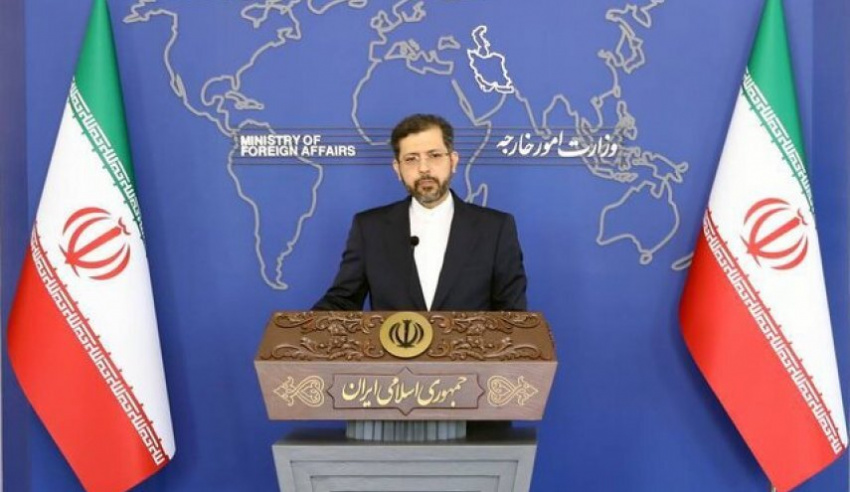"Foreign Ministry: Vienna talks not at “stalemate

Speaking at his weekly press briefing on Monday, Saeed Khatibzadeh said that the negotiations between Iran, the P4+1, and the United States have not been paused, and are going on without interruption.
“Messages are being exchanged through the European Union coordinator, Mr. Mora,” he added.
Khatibzadeh said that messages are being constantly exchanged between Tehran and Washington through the European Union.
Mora plans to visit Iran on Tuesday to reenergize talks to revitalize the nuclear deal. Reportedly, he will stay in Tehran until Friday.
“Mr. Mora's presence shows that we have continued to pursue the talks in the direction that needs to be done," he said.
He added that he hesitates to use the word “stalemate” for the Vienna talks, because the knots in the negotiations can be untied by Washington.
“A text has been agreed upon between Iran and P4+1. Washington is not to present a gift to Iran. It should give Iran's rights back. I won't use the word "stalemate" for the Vienna talks,” he noted.
The spokesman added that if the United States gives back what it has taken from Iran and accepts the lost rights of the Iranian people, Iran can return to Vienna the day after Mora's return to Vienna.
Khatibzadeh added that Mora's visit will put the Vienna talks on the right track.
He further said the United States is not going to do anything beyond its obligations. “The United States has stolen the rights of the Iranian people and has taken things from the pockets of the Iranian people that must be returned. If that happens, we can say that an agreement is at hand.”
Commenting on Washington’s role in reaching an agreement in Vienna, the spokesman reiterated that Washington's decision can easily make an agreement possible in Vienna.
In May 2018 former U.S. president Donald Trump quit the 2015 nuclear deal, officially known as the JCPOA, and returned sanctions under his “maximum pressure” strategy against Iran. His administration also introduced new ones under different pretexts to make a return to the pact difficult.
"Iran's rights under the JCPOA must be preserved, and we will not allow the elements of Trump's maximum pressure campaign to destroy the JCPOA and the opportunity for diplomacy to remain," Khatibzadeh reiterated.
Responding to a question about the reluctance of the Biden administration to delist Iran’s Islamic Revolution Guards Corps from the Foreign Terrorist Organization list, Khatibzadeh said, “I cannot disclose the information about the Vienna Talks. The framework designed for talks has been adhered to by the negotiating team. Points of difference between Iran and the U.S. are more than one just issue. Oversimplification of differential points is incorrect.”
Iran won’t wait for third parties to unfreeze its assets
Responding to a question about recent developments regarding unfreezing Iran’s froze funds, Khatibzadeh clarified, “Ask the Central Bank as well. We do not wait for any third party in releasing our resources. So far, the resources we have released have been released independently, and this path is still being pursued.”
No major developments in Iran-Saudi talks
Regarding the latest status of Iran’s negotiations with Saudi Arabia, Khatibzadeh stated that one of the issues discussed with the Saudis is regional issues.
“There has been no significant change in the Iran-Saudi Arabia talks in Baghdad since the previous round, and if there is a change, information will be provided,” he added.
Iraqi parliament speaker’s visit to Tehran was significant
Regarding the visit of Mohammad Al-Halbousi, speaker of the Iraqi Parliament to Tehran, the diplomat said that the situation of the Iraqi people and trade and economic relations with Iraq are very important for Iran.
“Iraq is one of our key trading partners. Solutions were found during this visit…. Mr. Halbousi's trip was significant, and projects that were delayed were discussed,” Khatibzadeh stated.
The spokesman added necessary explanations were given about the latest situation in Iraq during a meeting between the Iraqi parliament speaker and Iranian Foreign Minister Amir Abdollahian.
He said Iran hopes to see the transfer of power in Iraq as soon as possible.
“It is the worst thing to politicize an issue like water”
Responding to a question by the Tehran Times correspondent about a recent report regarding Iran stalling response to Iraq about negotiating common water issues, Khatibzadeh said, “Iran has a comprehensive view of shared waters and border waters, and we believe that no country in the region can manage shared waters alone. Whether Iran, Turkey, Afghanistan or Iraq. In the course of rivers, in some rivers Iran is upstream and in others Iraq or Turkey. We emphasize that we must work together on these common waters.”
He went on to criticize redirecting water flows by certain regional countries which have caused environmental problems, saying, “The situation of the people in this region is not good, and it proves that we have to work together, and the worst thing to do is to politicize an issue like water.”
We follow Afghanistan developments with concern
In response to a question about the escalation of terrorist attacks in Afghanistan, Khatibzadeh stressed that the security of Iran’s diplomatic premises and diplomats is of great importance.
“As soon as there was a sense of danger and initial reports reached us, Mr. Amir Abdollahian spoke with our consuls and ambassadors, and the necessary orders were given,” the spokesman said.
Noting that Iran is closely monitoring the situation in Afghanistan, he said that it is the direct responsibility of the governing body of Afghanistan to ensure security within its geographical borders.
He added that Iran is concerned about the situation of the Afghan people.
“Unfortunately, we are witnessing the growth of extremism and we were ready to help the current governing body of Afghanistan to fight terrorism,” he added.
Source: Tehran Times

